Napoli win Serie A: 'Football is everything' - what Scudetto means to Naples
- Published
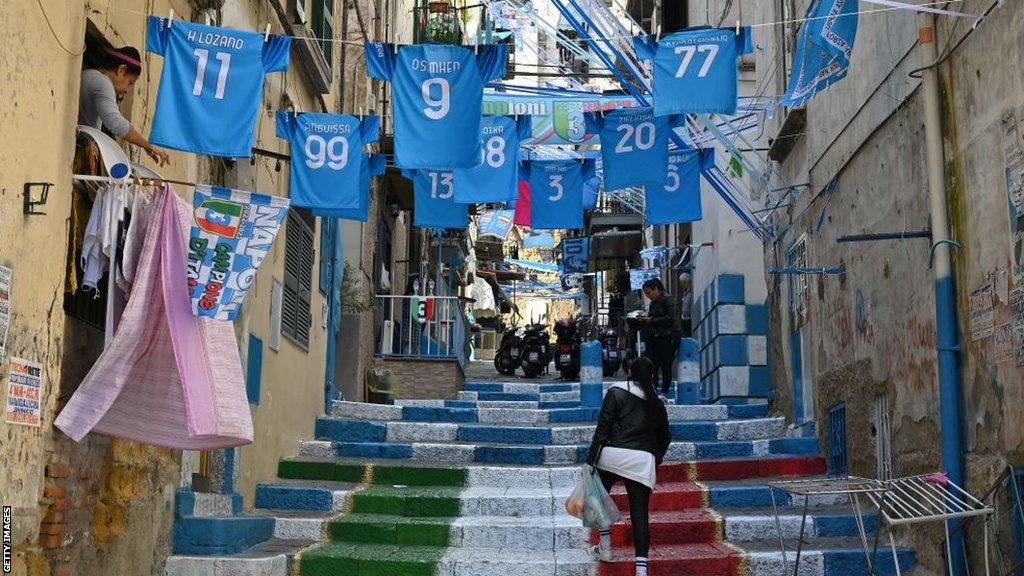
A shield, symbolising the Scudetto, has been painted on steps in Naples' Quartieri Spagnoli
A version of this article was first published on 6 April.
Naples is a city embracing success. You can see it, hear it, feel it. It's in the eyes and the smiles, the playful chatter and swaggering strides. Neapolitans can taste it, they're living every moment of it.
Napoli have cantered to a first title since 1990. Flags hailing the club's third championship hang from balconies, banners with "100% campione" ripple in the breeze. Even the usually superstitious Neapolitans have for months acknowledged this is their year.
Some feared the city won't cope with a party 33 years in the making. I Partenopei's game against Salernitana last Sunday was even moved back 24 hours as officials feared the potential for huge celebrations would clash with a major comic book convention.
That ended in a draw and those celebrations were put on hold, but they can finally be cranked up to full volume after Napoli clinched the title as far away from home as it is possible for them to travel in Serie A, at Udinese.
Provisions are in place for another huge party on 4 June - the final day of the season - as Naples bathes in the glory of a first championship since Diego Maradona strolled these narrow streets.
In the Quartieri Spagnoli, throughout Naples' historic centre, up to Stadio Diego Armando Maradona in Fuorigrotta and beyond, the streets are decked with blue and white festoons. Buildings and steps have been painted the same hues.
Life-size cutouts of the current squad stand in one piazza, club shirts and player posters are pegged to washing lines in alleyways, and youngsters queue for half a block to buy Napoli-coloured panino at popular sandwich shop Con Mollica o Senza., external
Hotel rooms for the next couple of months have nearly all gone. Expats wanting to celebrate, football fans intrigued by Napoli's story and visitors unexpectedly caught up in this historic moment are descending on the city. Sporting success coincides with a tourist boom.
"Naples is experiencing a moment of self-recognition and rediscovery of its greatness," says author Angelo Forgione.
Football Focus: Napoli on verge of ending 33-year wait for Serie A title
When Maradona inspired Napoli to a first Scudetto in 1987, fans placed a banner outside the city's largest cemetery proclaiming: "You don't know what you missed." Now, a generation too young to remember such glory are living it themselves.
"I was six months old in 1990 but I grew up watching VHS tapes of Diego Maradona," says Vincenzo Credendino, from CalcioNapoli24 TV. "Now this Scudetto is like reconnecting with that time."
Tributes to Luciano Spalletti's players intertwine with endless Maradona artwork. He is everywhere in Naples' charmingly gritty and dizzyingly chaotic labyrinth of streets - in bar windows, on bumper stickers and billboards, and etched across crumbling walls on giant murals.
At Bar Nilo, a strand of Maradona's hair rotates as part of a shrine to the Argentine. An underground museum displays the belongings acquired by his maid's son when Maradona left the city.
"Maradona is like God here," says 23-year-old fan Maria Roberta De Iesu. "He gave people hope. Neapolitans see themselves in Maradona."
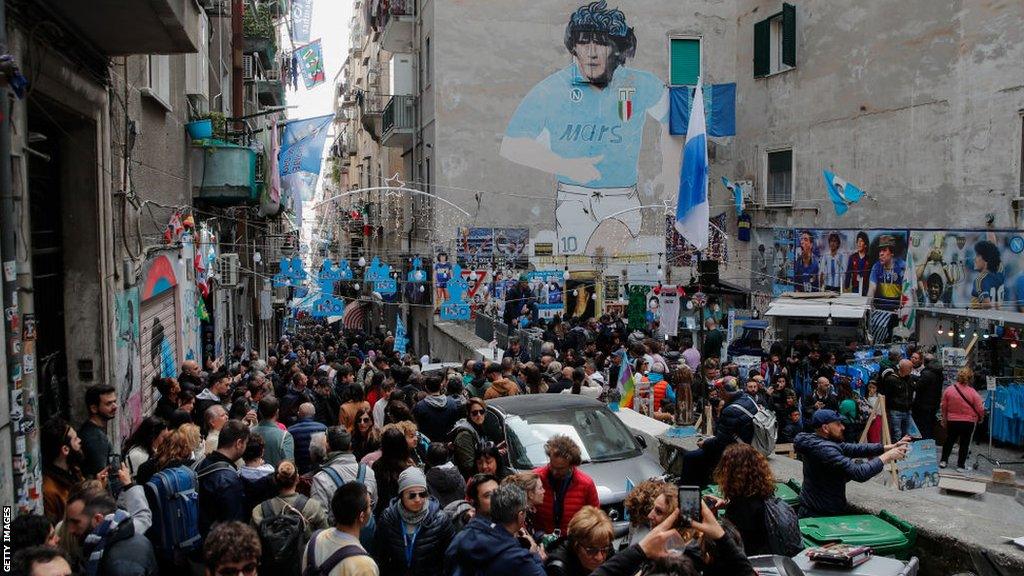
This mural in Quartieri Spagnoli became a shrine to Diego Maradona following his death in 2020
When Maradona arrived for a world record fee from Barcelona in July 1984, the city was still on its knees from an earthquake that had killed almost 2,500 people four years earlier. Feuds between the Camorra, the region's mafia, were as bitter as ever, unemployment was huge and the Bank of Naples was facing bankruptcy.
"Yet in a Naples on the bottom, Napoli, with the help of politics, managed to buy the strongest and most expensive footballer in the world and touch the sky," adds Forgione.
Then president Corrado Ferlaino had to lean on the city's mayor to help finance the deal, and fans offered contributions to help get it over the line. Anything to get Maradona.
'El Pibe de Oro' was everything to Naples, and Naples was everything to him. The city resonated with its Golden Boy not just because he inspired their club to two Serie A titles and a Uefa Cup but because they recognised him. He was anti-establishment, he echoed their principles and shouldered their concerns.
"Maradona was really good with his tongue, his mouth, his attitude," explains Credendino. "He understood how to get the heart of the Neapolitan people; he touched the right chords."
Maradona, despite his relationship with the Neapolitan mafia, brought "justice to the people" after struggles against the north that date back more than a century to the unification of Italy, says culture expert Francesco Carignani.
"He had many problems in his life but in Naples we only remember him for the joy," adds fan Paolo Cimmino. "We connect him as a man to a conqueror - the south won versus the north."
No club south of Rome had won Serie A since the Napoli of Maradona, Careca, Ciro Ferrara and a young Gianfranco Zola in 1990, and Neapolitans still endure hostile taunts from their northern rivals about crime, poverty, cholera outbreaks and calls for Mount Vesuvius to erupt over the city.
People here "are first of all Neapolitans and then Italian", explains Daniele 'Decibel' Bellini, Napoli's iconic stadium announcer. They have their own language, culture and history. Naples was once a thriving European capital, it remains a city of intriguing architecture, Caravaggio, pizza. Most of all, there is an intensity to life in Campania.
"Southern people in Italy, they live everything with love, with so much emotion, in different ways to the north," adds Cimmino.
Napoli had to fall before they could rise again. Financial decline, relegation and bankruptcy followed the glory years but the fans remained. More than 50,000 attended a game in Serie C in 2004-05.
"For our city soccer is so important," explains journalist Elena Lopresti. "It is not only football, it is a social instrument, a tool to develop us as a society."
Film producer Aurelio de Laurentiis seized an opportunity to purchase the club in 2004 and restore top-flight and European football to Napoli, the fourth-most well-supported club in Italy after Juventus, Milan and Inter, but one whose fanbase is concentrated in the region, rather than spread "from the Alps to Sicily" as Forgione says of the big three.
"De Laurentiis had a parachute," adds Credendino. "It was the love of the people, always ready to go to the stadium, always ready to support the team."
Naples, Forgione explains, is a rare European metropolis represented by a single club. "Napoli's victory is the victory of identity, of those who live it completely," he adds.
"In Naples, football is everything," says Cimmino. "It is joy, it is love, it is fun, it is sadness. It is a way to escape from the daily problems, a way to have fun with the people and party, and this period is happiness."
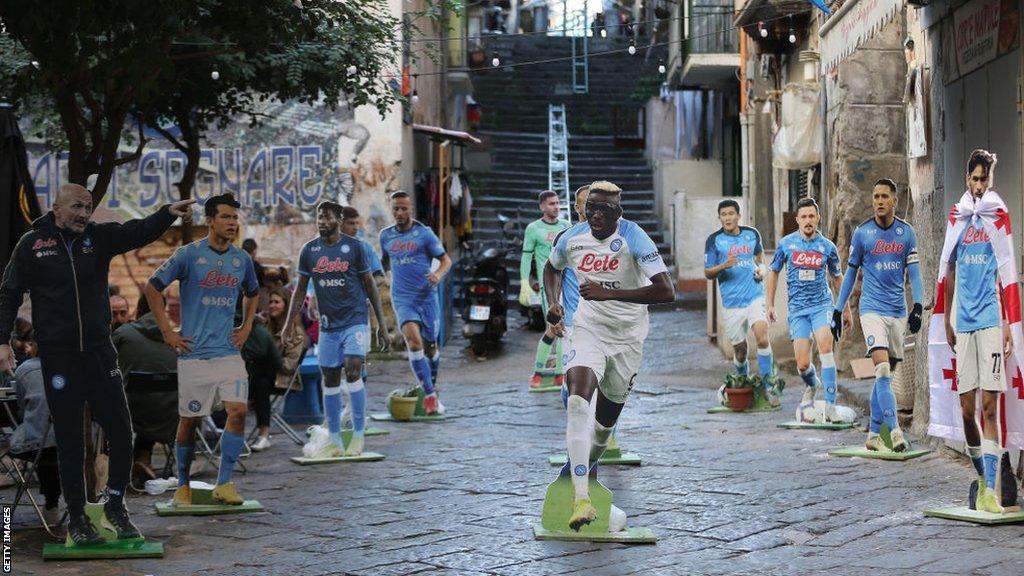
Cardboard cutouts of Napoli players stand in a piazza in Naples
The De Laurentiis era has been characterised by astute recruitment - Edinson Cavani, Ezequiel Lavezzi, Jorginho, Gonzalo Higuain - profitable sales, and falling short in the title race.
It was only last summer, after another championship bid slipped away, that ultras promised to return boss Spalletti's stolen Fiat Panda on the condition he left the club.
"Now he deserves a Ferrari, not a Panda," laughs journalist Credendino.
Spalletti is not from Naples, but he shares that Neapolitan passion. After being sacked by Inter, he spent two years on his farm in Tuscany before taking on the Napoli job. Now he lives by the training ground, and has worked relentlessly to deliver the Scudetto.
Maradona was the face of Napoli's previous triumph but this time unfamiliar heroes have emerged - cleverly acquired by sporting director Cristiano Giuntoli and fuelled by Spalletti's coaching.
"Giuntoli is the man of this miracle," says Credendino, despite some fans fretting when the club sold high-profile stars Kalidou Koulibaly, Lorenzo Insigne and Dries Mertens last year.
"Giuntoli discovered Khvicha Kvaratskhelia, he discovered Victor Osimhen, Kim Min-jae," adds Cimmino. "Spalletti makes this talent, makes this character. He can find the right keys to get the best of all the players. [Slovak midfielder Stanislav] Lobotka now looks like Iniesta, he looks like Xavi."
On a sold-out match day against Milan, outside the stadium that bears Maradona's name - an amphitheatre worthy of the Greeks who founded Neapolis, the "new city" - kids sport the mask of top scorer Osimhen and Georgian flags fly for irrepressible winger Kvaratskhelia.
There are a sprinkling of Boca and Argentina jerseys too, and, if there is a likeness to Maradona in this team, it is 22-year-old Kvaratskhelia. Signed from Dinamo Batumi last summer, he's aptly been dubbed "Kvaradona", but Cimmino sees him like Gianluigi Lentini at Torino or Kaka during his Milan years.
"He is incredibly unpredictable in the field," adds Credendino. "But if Maradona was a demigod, Kvaratskhelia is the Pope. He has a totally different attitude, a totally different personality."
Kvaratskhelia plays with a rugged urgency, socks around his ankles, calves exposed. He cavorts, he conjures. Against Milan, without 21-goal forward Osimhen - a man Spalletti calls a "dragon with two heads" - he could not stop a vacant and disjointed Napoli sliding to a jarring 4-0 defeat, though that only delayed their title celebrations.
Neapolitans' relationship with their club is complex. Rather than the result, the fallout was about wider issues. Scuffles broke out between different sets of ultras in Curva B over how to protest against De Laurentiis' ticket prices and rules over which flags or banners they can bring into the ground.
"De Laurentiis has a really complicated relationship with the city because the supporters don't like the power, and he represented the power," explains Carignani.
"But we have to say that this victory is great for him because he is a great businessman, he put passion in the city but also his entrepreneurship view in managing the team and that has made the difference."
Now, though, supporters and the board will both celebrate Napoli's first title in more than three decades. The fans have been asking the city's patron saint San Gennaro for this moment, they have called on the spirit of Maradona. Residents have been saving up in preparation for the mother of all celebrations.
"We just feel this power, this emotion," says De Iesu. "It will be a great party all around the city, all the squares will be full of people."
"Now we are enjoying it," adds Carignani. "It was worth the wait."
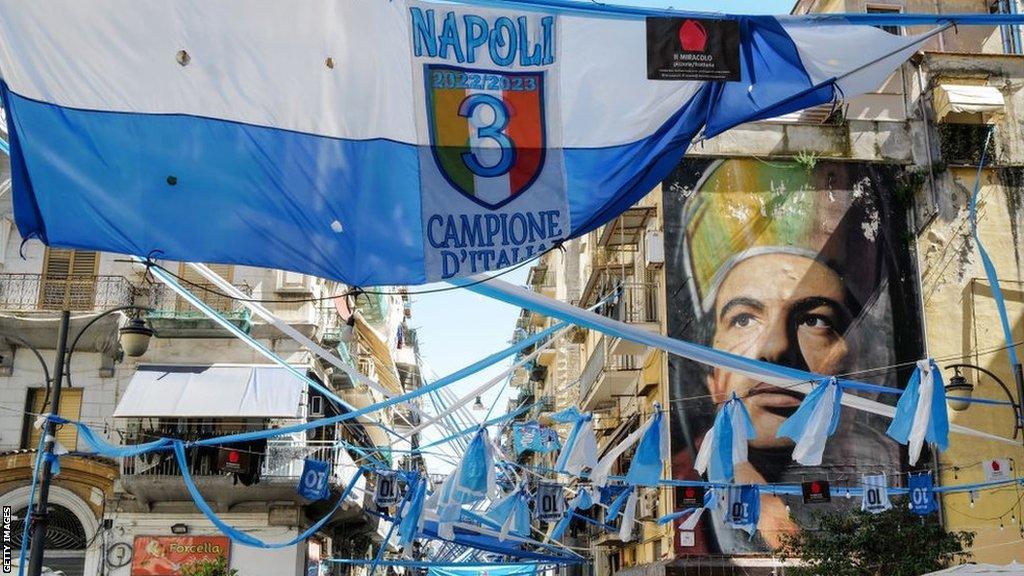
Banners celebrating Napoli's imminent Scudetto win hang in front of a San Gennaro mural in Napes
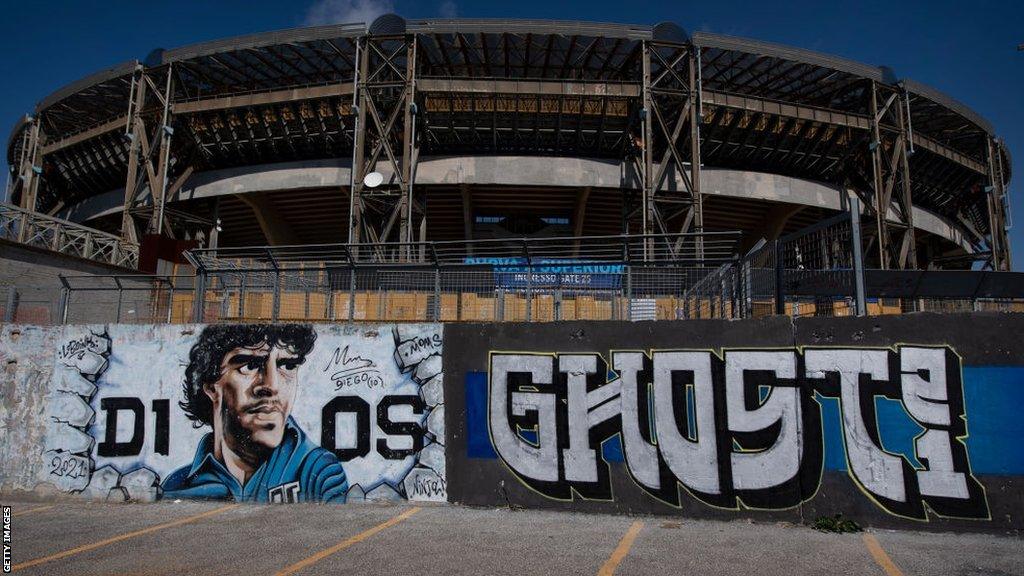
Stadio San Paolo was renamed after Diego Maradona in December 2020

From bedroom singer to a UK star: Jason Derulo is on the hunt for an exciting all-around artist
Does it matter which toothpaste you use? Greg Foot puts on a smile to investigate the claims behind different toothpastes
